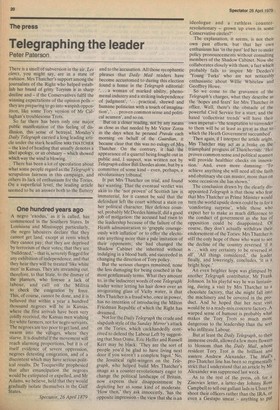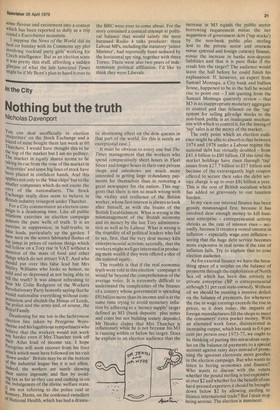Telegraphing the leader
Peter Paterson
There is a smell of subversion in the air. Les clercs, you might say, are in a state of trahison. Mrs Thatcher's support among the journalists of the Right who helped establish her brand of gritty Toryism is in sharp decline and — if the Conservatives fulfil the winning expectations of the opinion polls — they are preparing to go into waspish opposition, like some Tory version of Mr Callaghan's troublesome Trots.
So far there has been only one major public manifestation of this feeling of disillusion, this sense of betrayal. Monday's Daily Telegraph carried a long leading article under the stark headline MRS THATCHER — the kind of heading that usually denotes a libel apology, or an obituary — which showed which way the wind is blowing.
There has been a lot of speculation about what some people regard as the Telegraph's scrupulous fairness in this campaign, and others its lack of enthusiasm for the Tories. On a superficial level, the leading article seemed to be an answer both to the flattery and to the accusation. All those sycophantic phrases that Daily Mail readers have become accustomed to during this election found a home in the Telegraph editorial: `. . a woman of marked ability, phenomenal industry and a striking independence of judgment', `. . practical, shrewd and humane politician with a touch of imagination', . . proven common sense and political acumen', and so on.
But on a closer reading, not by any means as close as that needed by Mr Victor Zorza in the days when he perused Pravda each morning on behalf of the Guardian, it became clear that this was no eulogy of Mrs Thatcher. On the contrary, it had the appearance of a quarrel being fought out in public and, I suspect, was written not by Telegraph editor Bill Deedes alone, but by a committee of some kind — even, perhaps, a revolutionary tribunal.
It put Mrs Thatcher on trial, and found her wanting. That the eventual verdict was akin to the 'not proven' of Scottish law is immaterial, for it cannot be said that the defendant left the court without a stain on her political character. Her defence counsel, probably Mr Deedes himself, did a good job of mitigation: the accused had risen to the leadership because of the failure of the Heath administration to 'grapple courageously with inflation' or to offer the electorate anything more than a pale imitation of their opponents; she had changed the Shadow Cabinet she inherited without indulging in a blood bath, and succeeded in changing the direction of Tory policy.
But the serious charges remained, none the less damaging for being couched in the most gentlemanly terms. What they amount to, in the indiscreet words of one Telegraph leader writer letting his hair down over an invigorating glass of Vichy water, is that Mrs Thatcher is a fraud who, once in power, has no intention of introducing the Milton Friedman Republic of which the Right has dreamed.
Not for the Daily Telegraph the crude and slapdash style of the Sunday Mirror's attack on the Tories, which cackhandedly contrived to defend the Labour Left by suggesting that Stan Orme, Eric Heffer and Russell Kerr may be black: 'They are the sort of people you'd be glad to have living next door if you weren't a complete bigot.' No, the Jesuitical right-wingers on the Telegraph, who helped build Mrs Thatcher's image as a counter-revolutionary eager to change the political landscape of Britain, now express their disappointment by depicting her as some kind of moderate. 'How then,' they ask innocently, 'has the opposite impression —the view that she is an ideologue and a ruthless counterrevolutionary — grown up even in some Conservative circles?'
The explanation, it seems, is not their own past efforts, but that her own enthusiasm has 'in the past' led her to make policy pronouncements without consulting members of the Shadow Cabinet. Now she collaborates closely with them, a fact which probably fails to inspire Mr Deedes's 'Young Turks' who are not noticeably enthusiastic about Willie Whitelaw and Geoffrey Howe. So we come to the gravamen of the Telegraph's charges, what they describe as the 'hopes and fears' for Mrs Thatcher in office. Well, there's the obstacle of the powerful Civil Service for a start, and the hated 'collectivist trends' will have their own impetus — 'the temptation to surrender to them will be at least as great as that to which the Heath Government succumbed'.
Then again, if I interpret the article aright, Mrs Thatcher may act as a brake on the triumphant progress of Thatcherism: 'Her proven common sense and political acumen will provide healthier checks on innovation.' And, even more damning: 'To achieve anything she will need all the faith and obstinacy she can muster, more than on some occasions she has shown.'
The conclusion drawn by the clearly disappointed Telegraph is that those who fear that Mrs Thatcher as Prime Minister would turn the world upside down could be in fora 'comforting surprise', while those who expect her to make as much difference to the conduct of government as she has of opposition could be disappointed. Of course, they don't actually withdraw their endorsement of the Tories: Mrs Thatcher is still the only hope of those who want to see the decline of the country reversed 'if it is. . . with any certainty to be reversed at all'. 'All things considered,' the leader finally, and loweringly, concludes, 'it is a bright hope.' An even brighter hope was glimpsed by another Telegraph contributor, Mr Frank Johnson. In his playful way he was fantasising, during a visit by Mrs Thatcher to a chocolate factory, that she might fall into the machinery and be covered in the product. And he hoped that her next visit would be to a ready-mix concrete factory. A warped sense of humour is probably what makes the Tory Trots so much more dangerous to the leadership than the sort who infiltrate Labour.
But at least the Daily Telegraph, to their immense credit, allowed a few more flowers to blossom than the Daily Mail, whose resident Tory Trot is the brilliant and austere Andrew Alexander. The Mail's pro-Thatcher line has been so regimentally ' strict that I understand that an article by Mr Alexander was suppressed last week.
As to the rest of the press, oh for a Zinoviev letter, a latter-day Johnny Ross Campbell to tell our gallant lads in Ulster to shoot their officers rather than the IRA, or even a Gestapo smear — anything to Put some flavour and excitement into a contest Which has been reported as dully as a trip round a Euro-butter mountain. I suppose the News of the World did its best on Sunday with its Commons spy plot Involving 'cocktail party girls' working for Czech intelligence. But as an election scare It was pretty thin stuff, affording a sudden glimpse of what the late lamented Times might be if Mr Benn's plan to hand it over to the BBC were ever to come about. For the story contained a comical attempt at political balance that would satisfy the most harassed Radio 4 talks producer: three Labour MPs, including the statutory 'junior Minister', had reportedly been seduced by the horizontal spy ring, together with three Tories. There were also two peers of indeterminate political affiliation. I'd like to think they were Liberals.







































 Previous page
Previous page